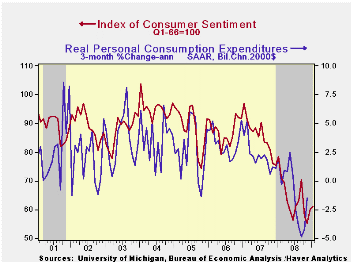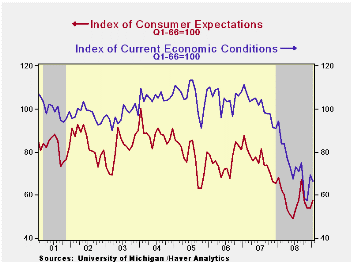 Global| Jan 30 2009
Global| Jan 30 2009Michigan Consumer Sentiment Up Slightly In January, Yet Still Near Series' Low
by:Tom Moeller
|in:Economy in Brief
Summary
The January consumer sentiment index from the University of Michigan rose slightly for the second month. The 1.8% rise was slightly less than indicated in the mid-month report but it followed an 8.7% increase off the cycle's low in [...]

The January consumer sentiment index from the University of Michigan rose slightly for the second month. The 1.8% rise was slightly less than indicated in the mid-month report but it followed an 8.7% increase off the cycle's low in December. Nevertheless, at 61.2, the latest level was close to the lows for the series which occurred in the severe recessions of 1973-75 and 1980. Moreover, the figure remained down nearly one-quarter from last year. The latest reading about matched Consensus expectations for a reading of 61.9.
During the last ten years there has been a 58% correlation between the level of sentiment and the three-month change in real consumer spending.
The expectations component of consumer sentiment rose moderately. Still, the series was near its lowest since 1990 and close to the low of 1980. Expectations for business conditions during the next year rose somewhat and expectations for conditions during the next five years also ticked up. The expected change in personal finances rose to the highest level since September.
The current economic conditions index fell after an initial reading that was unchanged from December. The buying conditions index for large household goods fell sharply but the view of current personal finances rose (surprisingly) to the highest level since September. The figure did, however, remain off sharply from the 2007 average.
The opinion of government policy, which apparently influences economic expectations, was about unchanged but off a sharp 28.2% during the last twelve months. Only seven percent of respondents thought that a good job was being done by government and a near-record fifty-one percent thought that a poor job was being done.
Inflation expectations ticked slightly higher to 2.5% during the next year but that remained near the series' low. It was as high as 7.0% in May. The expected inflation rate during the next five years rose off the series' low to 3.7%.
The University of Michigan survey is not seasonally adjusted.The reading is based on telephone interviews with about 500 households at month-end; the mid-month results are based on about 300 interviews. The summary indexes are in Haver's USECON database, with details in the proprietary UMSCA database.
| University of Michigan | January | December | November | January y/y | 2008 | 2007 | 2006 |
|---|---|---|---|---|---|---|---|
| Consumer Sentiment | 61.2 | 60.1 | 55.3 | -21.9% | 63.8 | 85.6 | 87.3 |
| Current Conditions | 66.5 | 69.5 | 57.5 | -29.6 | 73.7 | 101.2 | 105.1 |
| Expectations | 57.8 | 54.0 | 53.9 | -15.1 | 57.3 | 75.6 | 75.9 |
Tom Moeller
AuthorMore in Author Profile »Prior to joining Haver Analytics in 2000, Mr. Moeller worked as the Economist at Chancellor Capital Management from 1985 to 1999. There, he developed comprehensive economic forecasts and interpreted economic data for equity and fixed income portfolio managers. Also at Chancellor, Mr. Moeller worked as an equity analyst and was responsible for researching and rating companies in the economically sensitive automobile and housing industries for investment in Chancellor’s equity portfolio. Prior to joining Chancellor, Mr. Moeller was an Economist at Citibank from 1979 to 1984. He also analyzed pricing behavior in the metals industry for the Council on Wage and Price Stability in Washington, D.C. In 1999, Mr. Moeller received the award for most accurate forecast from the Forecasters' Club of New York. From 1990 to 1992 he was President of the New York Association for Business Economists. Mr. Moeller earned an M.B.A. in Finance from Fordham University, where he graduated in 1987. He holds a Bachelor of Arts in Economics from George Washington University.






